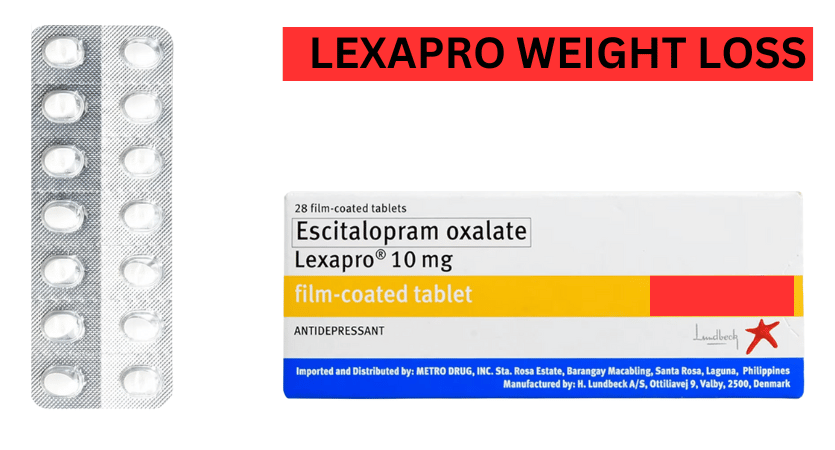Numerous individuals report experiencing weight loss while on Lexapro, an SSRI used to treat anxiety and depression. These stories often highlight a complex relationship between medication, mental health, and body weight.
Crafting content that catches the eye of search engines requires blending art with science. As an antidepressant, Lexapro (escitalopram) has weight change potential, sparking unique personal tales of weight loss that reflect its varied effects on different people’s appetites and metabolisms.
While some may find their weight decreases during Lexapro treatment, it’s crucial to consult with healthcare providers to understand individual reactions and ensure overall health and well-being. Our mental and physical states are intrinsically linked; understanding one’s journey with Lexapro involves looking at the entire person, not just the scale. With narratives circulating across forums and health sites, the topic of weight change on Lexapro resonates with many who seek both mental wellness and physical balance.
Introduction To Lexapro And Weight Changes
Many individuals embarking on a journey with Lexapro, also known as Escitalopram, are curious about the potential effects it may have on their weight. This antidepressant, commonly used to treat anxiety and depression, has various impacts on the body, and weight change is an area of both concern and interest for those prescribed this medication. While some users report unintentional weight loss, others experience a slight increase in their weight. This section will explore Lexapro’s relationship with weight, providing personal experiences and a scientific look into why these changes may occur.
What Is Lexapro And Its Primary Uses

Lexapro is an FDA-approved medication for the treatment of major depressive disorder and generalized anxiety disorder. It falls under the category of selective serotonin reuptake inhibitors (SSRIs) and works by increasing serotonin levels in the brain, which can help improve mood and reduce anxiety. Here’s an overview:
- Depression: Often used as a first-line treatment.
- Anxiety: Helps to reduce the symptoms of generalized anxiety disorder over time.
- Long-term management: Some individuals may use Lexapro long-term to manage their conditions.
Common Side Effects Of Lexapro, Including Weight Changes
As with any medication, Lexapro comes with a range of potential side effects. Weight changes are among the side effects that need consideration. Here’s a table summarizing some common side effects:
| Side Effect | Frequency |
| Nausea | Common |
| Dry Mouth | Common |
| Sleep Difficulties | Common |
| Weight Changes | Varies |
Why Lexapro May Lead To Weight Loss For Some Individuals
Weight loss on Lexapro may not be a direct effect of the medication itself. Instead, it’s often the result of an intricate interplay between several factors. Potential reasons include:
- Reduction in Depression-Related Appetite Increase: As depression subsides, so might the overeating habits related to it.
- Side Effects: Nausea or diarrhea can decrease appetite temporarily.
- Lifestyle Changes: Improvement in mood and energy might lead to more physical activity and a healthier diet.
Understanding the nuances of how Lexapro affects weight requires a comprehensive look at individual health profiles and lifestyle choices.
Personal Accounts Of Weight Loss On Lexapro
Lexapro, an SSRI widely prescribed for anxiety and depression, does not typically list weight loss as a primary side effect. Yet, the internet is abuzz with anecdotal evidence suggesting that some individuals may experience weight reductions as they adjust to the medication. Below we highlight three distinctive sources that collectively represent the varied experiences of those who have reported changes in their weight while on Lexapro.
Compiling User Experiences From Forums And Reddit
Gleaning insights from the depths of health forums and Reddit threads, it’s evident that individual experiences with Lexapro and weight changes are as varied as the users themselves. We’ve sifted through countless posts and discussions, identifying patterns and outliers in these personal anecdotes. Common themes emerge surrounding lifestyle adjustments, dietary changes, and the accompanying shifts in mental health, all of which contribute to a complex tapestry of results.
- User-reported benefits leading to potential weight loss
- Side effects such as nausea possibly affecting appetite
- Behavioral changes post-medication initiation
Analyzing Celebrity Stories: Case Of Gerard Way
Not immune to the same struggles as the rest of the population, celebrities also share their journeys with mental health treatments and the side effects therein. Gerard Way, known for her role in My Chemical Romance, has been open about her experience with antidepressants and their impact on her weight. After a medication adjustment, Winter shared his weight loss story, offering a high-profile perspective on how switching medications, like Lexapro, can lead to notable changes in physique.
Success Stories From The Lexapro Community
The collective voice of the Lexapro community provides a plethora of success stories. Many individuals express that with close monitoring of their diet and exercise routines, weight loss on Lexapro is indeed achievable. Here are a few case studies where users reported their success:
| User | Duration on Lexapro | Weight Loss Reported |
| LexaFit123 | 6 months | 12 lbs |
| WellbeingWarrior | 1 year | 20 lbs |
| HappyHealthyMe | 3 months | 8 lbs |
Understanding The Mechanisms Behind Weight Loss On Lexapro
Exploring the narrative of Lexapro weight loss stories invigorates hope for individuals seeking relief from depression or anxiety, along with a desire to manage their weight. Misunderstanding and speculation often surround the topic of weight changes with antidepressants. Diving into the science, this section illuminates how Lexapro, a selective serotonin reuptake inhibitor (SSRI), can influence body weight.
How Lexapro Affects Appetite And Metabolism
Lexapro, known generically as escitalopram, often alters appetite and metabolism — two critical players in weight management. Interestingly, some individuals report a reduction in appetite after commencing treatment with Lexapro. The medication can also modify how the body processes energy and stores fat. To understand these changes clearly, examine the following points:
- Lexapro may increase serotonin levels in the brain, which can lead to feeling full sooner during a meal.
- Changes in metabolism can occur, influencing how calories are burned throughout the day. Yet, research on this mechanism is not definitive.
Psychological Impact Of Lexapro Leading To Weight Loss
The psychological implications of Lexapro on body weight are profound. As the medication takes effect, it can diminish symptoms of anxiety and depression, leading to healthier eating patterns and increased motivation for physical activity. These behavioral adjustments can result in weight loss. Consider the following psychological impacts:
- Improved mood and decreased anxiety reduce emotional eating.
- An increase in energy and motivation encourages more consistent physical activity.
Comparative Analysis With Other Ssris And Their Weight-related Effects
When compared to other SSRIs, Lexapro’s impact on weight is distinct. Here’s a comparative table to provide insight:
| SSRI | Common Weight Change | Notes |
| Lexapro (Escitalopram) | Neutral/Weight Loss | Less likely to cause weight gain compared to other SSRIs; potential for weight loss or neutral effect. |
| Paxil (Paroxetine) | Weight Gain | Associated with significant weight gain. |
| Zoloft (Sertraline) | Variable | Some people experience weight loss, others may gain weight. |
| Prozac (Fluoxetine) | Neutral/Weight Loss | Considered weight-neutral or may contribute to weight loss, especially in long-term use. |
By studying the above analysis, it is clear that Lexapro stands out as a preferable option for individuals concerned about weight changes on SSRIs. However, individual responses to these medications can vary widely.

Credit: www.hollyfisherhiggins.com
Navigating Weight Loss While On Lexapro
Embarking on a weight loss journey can be challenging, especially when you’re taking medications such as Lexapro that may influence your appetite and metabolism. Sharing insights into Lexapro weight loss stories can illuminate how individuals manage to shed pounds despite their prescription. This section aims to equip readers with knowledge and strategies to navigate their weight loss journey while on Lexapro.
Diet And Exercise Tips Tailored For Lexapro Users
Understanding your body’s response to Lexapro is crucial in customizing a diet and exercise plan that aligns with your weight loss goals. Here are some personalized tips:
- Stay Hydrated: Drinking plenty of water can help manage appetite and enhance metabolism.
- Focus on Nutrient-Dense Foods: Emphasize fruits, vegetables, lean proteins, and whole grains to nourish your body.
- Incorporate Regular Exercise: A mix of cardiovascular activities and strength training can aid in burning calories and building muscle.
- Monitor Portion Sizes: Be mindful of the quantity of food to prevent overeating.
Consistency is key to seeing results, so incorporate these habits into your daily routine for the best outcome.
When To Consult A Healthcare Provider About Your Weight Changes
Weight fluctuations while on Lexapro can be normal, but it’s important to know when to seek professional advice. You should contact your healthcare provider if you experience:
- Significant weight loss or gain without a clear reason.
- Changes in eating habits, appetite, or physical activity that don’t align with your weight changes.
- Are there any other symptoms that concern you?
A healthcare professional can assess your situation, offer guidance, and adjust your treatment plan if necessary.
Weight Management Strategies And Maintaining Healthy Habits
Adopting strategies for weight management while on Lexapro is essential for long-term success. Here are practices that can help you maintain a healthy lifestyle:
| Strategy | Description |
| Set Realistic Goals | Establish achievable and measurable objectives to keep motivated. |
| Track Progress | Use a journal or an app to monitor your diet, exercise, and weight changes. |
| Seek Support | Connect with friends, family, or support groups for encouragement and accountability. |
| Mindful Eating | Pay attention to your body’s hunger and fullness cues to prevent overeating. |
Combining these strategies with a positive mindset and patience paves the way for successful weight management while on Lexapro.
Debunking Myths And Setting Expectations
Embarking on a journey with Lexapro, or any medication, carries certain expectations. Among them are the effects on one’s weight, which can range widely from person to person. The topic of Lexapro causing weight loss captures the interest of many, but it’s wrapped in myths and misconceptions. This part of the blog aims to clarify what you can expect in terms of weight changes when starting this medication.
Addressing The Misconception That Lexapro Always Leads To Weight Loss
It’s crucial to confront the false belief that Lexapro inherently leads to weight loss. The truth is, while some individuals may report losing weight as a result of decreased appetite or other side effects, this is not a universal outcome. The medication can have the opposite effect on others, prompting weight gain. Understanding that each person’s body reacts differently to medication is key.
Expected Timeline: How Soon Can Weight Changes Occur After Starting Lexapro?
For those curious about the timeline for potential weight changes, it varies. Some may notice changes within the first few weeks, while others might see differences over months or not at all. The influence of Lexapro on weight is a byproduct of its primary function, not a direct effect, meaning that timing cannot be pinpointed with certainty.
The Importance Of Maintaining Realistic Expectations For Body Changes While On Medication
It’s important to maintain realistic expectations about body changes when starting any medicinal therapy. A balanced diet and regular exercise are critical factors in managing weight, regardless of Lexapro’s role. Emotional and psychological improvements should be the priority, with an understanding that weight flux may or may not accompany these changes.
Takeaways
As we conclude our examination of Lexapro and its relationship with weight, a complex picture emerges—balanced on the fulcrum of individual stories and scientific understandings. Let’s distill the pivotal lessons learned from these narratives.
Summarizing The Varying Effects Of Lexapro On Weight:
The journey of weight fluctuation while on Lexapro is as personal as the medication’s effects on mood and mental health. Despite its common profile as a weight-neutral drug, anecdotal evidence suggests wide-ranging outcomes:
- Some individuals report unexpected weight loss, attributing it to side effects such as nausea or a reduction in appetite.
- Conversely, others experience weight gain, possibly due to improvements in mood and subsequently increased appetite.
- A significant number report no noticeable change in their weight status.
To paint an accurate picture, one must delve into the nuances of each person’s metabolic response and lifestyle factors post-medication.
How Individual Experiences Contribute To Our Understanding Of Ssris And Weight:
Lexapro, an SSRI, has a unique interplay with weight that puzzles both patients and practitioners. The mosaic of personal accounts adds depth to clinical data, revealing a spectrum of reactions that underscore how individualized medication effects truly are.
Each story is a brushstroke in a larger image illustrating the complex relationship between SSRIs like Lexapro and body weight. Collectively, these experiences are invaluable, aiding the medical community in tailoring more evidence-based treatment plans to support holistic well-being.
Balancing Mental Health Treatment With Weight Loss Goals:
In pursuit of mental wellness, Lexapro often proves an effective ally. Yet, the quest for weight stability, or reduction, may introduce challenges for some. It is critical to approach this interplay deliberately, ensuring that both mental and physical health are maintained.
- Engaging with healthcare providers to monitor weight changes and discuss concerns is essential.
- Exploring alternative SSRIs if weight fluctuations become problematic may be an option.
- Lifestyle adaptations, including diet and exercise, should complement pharmacological interventions to achieve desired weight outcomes.
Remember, the priority is the amelioration of mental health symptoms. With the right strategies, individuals can navigate the terrain of managing weight alongside mental health conditions, utilizing Lexapro as one of the tools in their arsenal.
Frequently Asked Questions For Lexapro Weight Loss Stories
Did Anyone Lose Weight On Lexapro?
Some individuals report weight loss while on Lexapro, although it is not a typical side effect of the medication. Weight loss may relate to improved symptoms.
Can You Lose 20 Pounds In 4 Months?
Yes, losing 20 pounds in four months is achievable through a consistent diet and exercise plan.
Can You Lose 100 Pounds In 3 Months?
Losing 100 pounds in 3 months is highly unlikely and unsafe; a healthy weight loss is 1-2 pounds per week.
How Many Pounds Lost Before You Notice?
On average, losing between five to ten pounds is noticeable.
Conclusion:
We’ve explored various personal accounts of weight fluctuations while on Lexapro, from losses to gains. Each story underscores the individuality of our bodies’ responses to medication. Should you consider Lexapro, consult a healthcare professional to navigate its effects. Remember, your journey is unique, and professional guidance is key to managing both mental health and body weight effectively.
Stay informed, and prioritize your well-being in any health decision.




Leave a Reply